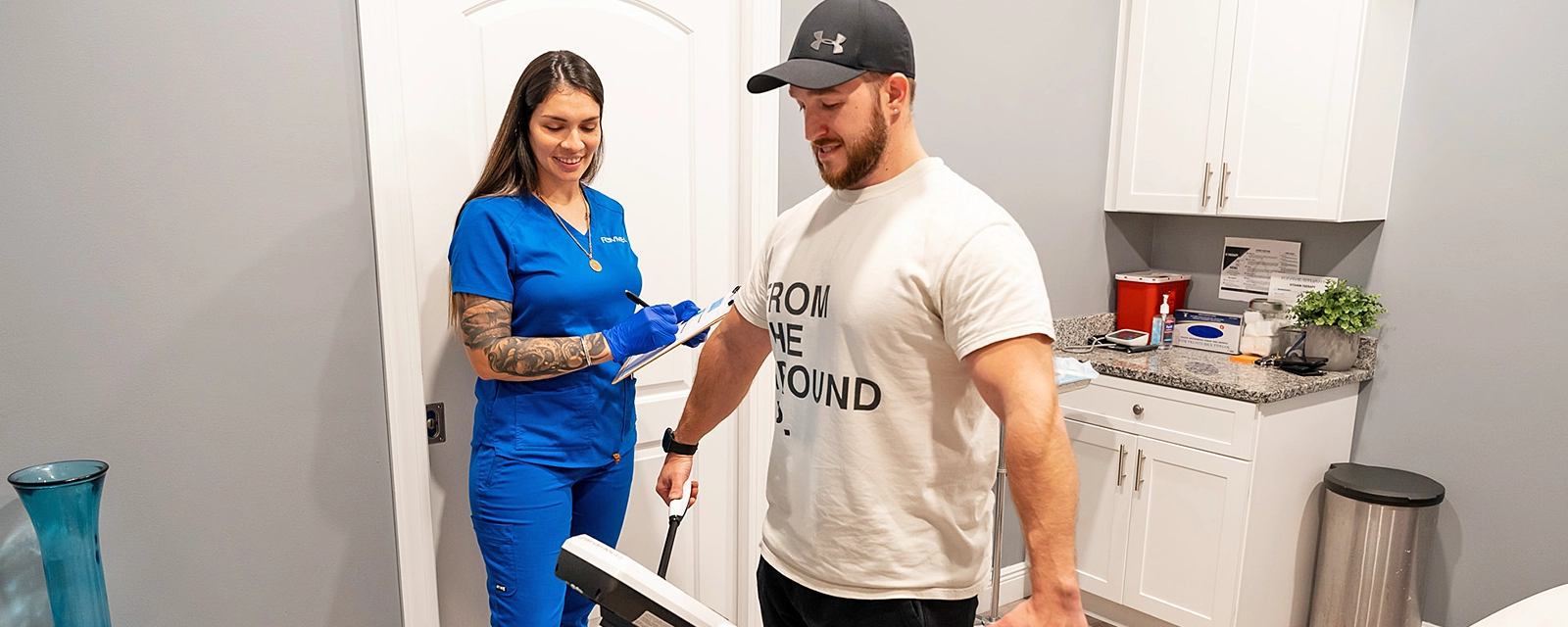In the realm of metabolic health and weight management, G3 Peptide is emerging as a groundbreaking therapy. This innovative peptide therapy treatment offers hope to individuals struggling with obesity, type 2 diabetes, and other metabolic disorders. In this comprehensive guide, we’ll delve into what G3 Peptide is, how it works, its benefits, and why it represents a significant advancement in the field of weight loss and metabolic wellness.
Understanding G3 Peptide
G3 Peptide, also known as Retatrutide, is a novel multi-receptor agonist that targets three key receptors involved in metabolic regulation: GLP-1, GIP, and glucagon receptors. By activating these receptors simultaneously, G3 Peptide offers a multifaceted approach to managing weight, blood sugar levels, and overall metabolic health.
The Science Behind G3 Peptide
- GLP-1 Receptor Activation: Enhances insulin secretion, suppresses glucagon release, slows gastric emptying, and reduces appetite.
- GIP Receptor Activation: Promotes insulin release in response to nutrient intake and may have direct effects on adipose tissue.
- Glucagon Receptor Activation: Increases energy expenditure by stimulating glucose production and promoting fat breakdown.
By engaging all three pathways, G3 Peptide addresses multiple facets of metabolic dysfunction, making it a potent candidate for treating complex conditions like obesity and type 2 diabetes.
Benefits of G3 Peptide in Weight Management
1. Significant Weight Loss with G3 Peptide
Clinical trials have shown that G3 Peptide can lead to substantial reductions in body weight. By targeting appetite regulation and increasing energy expenditure, patients may experience:
- Reduced Caloric Intake: Due to decreased hunger and increased feelings of fullness.
- Enhanced Fat Burning: Stimulated by glucagon receptor activation.
2. Improved Glycemic Control
For individuals with type 2 diabetes or prediabetes, G3 Peptide offers significant benefits:
- Enhanced Insulin Secretion: Improves the body’s ability to regulate blood sugar.
- Lower Fasting Glucose Levels: Helps maintain healthy blood sugar levels.
- Better HbA1c Outcomes: Indicates improved long-term glucose control.
3. Cardiovascular Health Benefits
Weight loss and improved metabolic parameters contribute to better cardiovascular health:
- Lower Blood Pressure: As weight decreases, so can hypertension.
- Improved Lipid Profiles: Reduction in LDL cholesterol and triglycerides.
- Reduced Inflammation: Weight loss can decrease systemic inflammation, benefiting heart health.
How G3 Peptide Compares to Other Therapies
While other medications target single receptors, G3 Peptide’s triple-receptor approach may offer superior results:
- Greater Weight Reduction: Potentially more effective than single or dual agonists.
- Comprehensive Metabolic Effects: Addresses multiple hormonal pathways simultaneously.
- Broader Therapeutic Use: May benefit a wider range of metabolic disorders.
These results highlight G3 Peptide’s potential as a powerful tool in weight management and metabolic health.
Safety Profile
G3 Peptide was generally well-tolerated in clinical studies:
- Common Side Effects: Included mild to moderate gastrointestinal symptoms like nausea and diarrhea, which typically decreased over time.
- Low Discontinuation Rates: Few participants withdrew from studies due to adverse effects.

Mechanism of Action: A Deeper Dive into G3 Peptide
Appetite Suppression
By activating the GLP-1 receptor, G3 Peptide influences the hypothalamus, the brain’s hunger control center:
- Increased Satiety: Patients feel fuller faster and for longer periods.
- Reduced Cravings: Particularly for high-calorie, high-fat foods.
Enhanced Energy Expenditure
Through glucagon receptor activation:
- Stimulates Thermogenesis: The body’s heat production process, burning more calories.
- Promotes Fat Breakdown: Breaking down stored fats for energy.
Improved Insulin Sensitivity
Activation of GIP receptors:
- Augments Insulin Release: In response to food intake.
- Enhances Glucose Uptake: By muscle and adipose tissue.
Potential Applications Beyond Weight Loss
While primarily studied for weight management and diabetes, G3 Peptide may have additional therapeutic applications:
- Non-Alcoholic Fatty Liver Disease (NAFLD): Improved metabolic parameters could benefit liver health.
- Cardiovascular Disease Prevention: Through weight loss and improved lipid profiles.
- Polycystic Ovary Syndrome (PCOS): Weight loss and insulin sensitivity improvements may alleviate symptoms.
Integrating G3 Peptide Therapy into a Comprehensive Weight Loss Plan
At Relive Health Hendersonville, we recognize that effective weight management requires a holistic approach.
Personalized Treatment Plans with G3 Peptide
- Medical Assessment: Thorough evaluation to determine suitability for G3 Peptide therapy.
- Customized Dosage: Tailored to individual needs and health goals.
- Monitoring and Support: Regular follow-ups to track progress and adjust treatment.
Lifestyle Modifications
- Nutritional Counseling: Guidance on a balanced, nutrient-rich diet to complement therapy.
- Physical Activity Recommendations: Exercise plans that fit individual preferences and abilities.
- Behavioral Support: Strategies to address emotional and psychological factors related to eating and weight.
Educational Resources
- Workshops and Seminars: Information on metabolic health, peptide therapy, and sustainable lifestyle changes.
- Online Support Groups: Community forums to share experiences and encouragement.

Mechanism of Action: A Deeper Dive
Appetite Suppression
By activating the GLP-1 receptor, G3 Peptide influences the hypothalamus, the brain’s hunger control center:
- Increased Satiety: Patients feel fuller faster and for longer periods.
- Reduced Cravings: Particularly for high-calorie, high-fat foods.
Enhanced Energy Expenditure
Through glucagon receptor activation:
- Stimulates Thermogenesis: The body’s heat production process, burning more calories.
- Promotes Lipolysis: Breaking down stored fats for energy.
Improved Insulin Sensitivity
Activation of GIP receptors:
- Augments Insulin Release: In response to food intake.
- Enhances Glucose Uptake: By muscle and adipose tissue.
Potential Applications Beyond Weight Loss
While primarily studied for weight management and diabetes, Retatrutide may have additional therapeutic applications:
- Non-Alcoholic Fatty Liver Disease (NAFLD): Improved metabolic parameters could benefit liver health.
- Cardiovascular Disease Prevention: Through weight loss and improved lipid profiles.
- Polycystic Ovary Syndrome (PCOS): Weight loss and insulin sensitivity improvements may alleviate symptoms.
Integrating G3 Peptide Therapy into a Comprehensive Weight Loss Plan
At Relive Health Hendersonville, we recognize that effective weight management requires a holistic approach:
Personalized Treatment Plans
- Medical Assessment: Thorough evaluation to determine suitability for Retatrutide therapy.
- Customized Dosage: Tailored to individual needs and health goals.
- Monitoring and Support: Regular follow-ups to track progress and adjust treatment.
Lifestyle Modifications
- Nutritional Counseling: Guidance on a balanced, nutrient-rich diet to complement therapy.
- Physical Activity Recommendations: Exercise plans that fit individual preferences and abilities.
- Behavioral Support: Strategies to address emotional and psychological factors related to eating and weight.
Educational Resources
- Workshops and Seminars: Information on metabolic health, peptide therapy, and sustainable lifestyle changes.
- Online Support Groups: Community forums to share experiences and encouragement.

Frequently Asked Questions About G3 Peptide
1. Is G3 Peptide FDA-Approved?
As of October 2023, G3 Peptide is undergoing clinical trials and is not yet FDA-approved. It’s essential to consult with healthcare providers for the most current information.
2. Who Can Benefit from G3 Peptide Therapy?
- Individuals with Obesity: Those with a BMI indicating obesity.
- Patients with Type 2 Diabetes: Especially if weight loss is a treatment goal.
- People with Metabolic Syndrome: Including insulin resistance, hypertension, and dyslipidemia.
3. What Are the Side Effects of G3 Peptide?
- Common Side Effects: Nausea, vomiting, diarrhea, and constipation.
- Less Common Side Effects: Injection site reactions, headaches.
- Management: Side effects often diminish over time; dose adjustments can help.
4. How Is G3 Peptide Administered?
- Injection: Typically administered via subcutaneous injection.
- Frequency: Often once weekly, but the regimen may vary based on medical advice.
5. Do I Need to Change My Diet and Exercise Habits?
While G3 Peptide can significantly aid in weight loss, combining therapy with dietary changes and physical activity enhances results and promotes overall health.

Why Choose Relive Health Hendersonville for G3 Peptide Therapy
Expertise and Experience with G3 Peptide
- Qualified Professionals: Our team includes experts in peptide therapies and metabolic health.
- Evidence-Based Practices: We stay updated on the latest research to provide cutting-edge treatments.
Personalized Care
- Individualized Attention: We understand that each patient’s journey is unique.
- Comprehensive Support: From initial consultation to ongoing follow-ups, we’re with you every step of the way.
State-of-the-Art Facility
- Modern Amenities: Our clinic is equipped with the latest technology to ensure effective treatment.
- Comfortable Environment: We strive to make your experience as pleasant as possible.
Taking the First Step Toward a Healthier You
Embarking on a weight loss journey can be daunting, but you don’t have to do it alone. G3 Peptide offers a promising avenue for those who’ve struggled with traditional methods.
Schedule a Consultation Today
- Phone: Ph : +1 (615) 348-2388
- Email: info@relivehendersonville.com
- Address: 165 Indian Lake Blvd # 109, Hendersonville, TN 37075
Let Relive Health Hendersonville guide you toward achieving your health goals with personalized care and innovative therapies.
Related Services
- Botox Treatments: Enhance your appearance with our expert Botox services.
- Hormone Replacement Therapy: Balance your hormones for improved well-being.
External Resources
- American Diabetes Association: Comprehensive information on diabetes management.
- Obesity Action Coalition: Resources and support for individuals dealing with obesity.


